
Successful Closing Ceremony of
「World Korean Educators Conference 2018」
Participation of 150 teachers from 101 KSIs in 44 countries
Certificates for 16 newly designated KSIs in 13 countries
The closing ceremony of the four-day 「World Korean Educators Conference 2018」, the festival for Korean language teachers around the globe, was held on July 13th.
The Ministry of Culture, Sports and Tourism and King Sejong Institute Foundation (KSIF) co-hosted the 10th World Korean Educators Conference at COEX convention center and at Le Méridien Seoul Hotel from July 10th to 13th. This year marks the 10th anniversary and about 200 educators from 101 institutes in 44 countries and local experts of Korean language and culture education participated in the event.
First Vice-Minister of Culture, Sports and Tourism, Na Jong-min,
Promises Further Support for KSIs at Opening Ceremony
On July 10th, First Vice-Minister of Culture, Sports and Tourism Na Jong-min, Director of National Hangeul Museum Park Young-goog, President of Korea National University of Arts Kim Bong-ryeol, and renowned Korean actor Ahn Sung-ki attended the opening ceremony. Mr. Na announced that the Ministry of Culture, Sports and Tourism will take responsive action to meet the growing demand for Korean language classes and provide further support to strengthen the management of King Sejong Institutes. Song Seung-hwan, the executive director of the opening and closing ceremonies of the PyeongChang 2018 Winter Olympics, delivered a keynote speech with the topic of “Korean culture and PyeongChang 2018 Winter Olympics.” A special lecture was given by Choi Jin-gi, a representative lecturer of Oh My School with the topic of “Korean as the language of communication, answered by the fourth industrial revolution.” It was followed by Jo Seung-yeon who shed light on the Korean language and culture under the title, “Language and communication.”
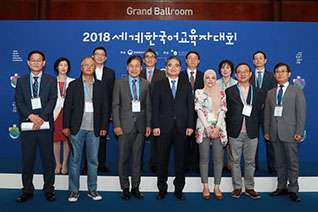
▲ Group photo of guests
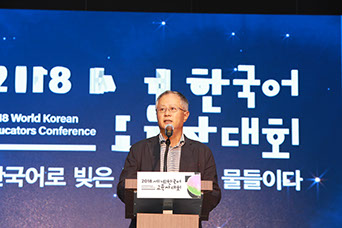
▲ Keynote Speech by Director Song Seung-hwan
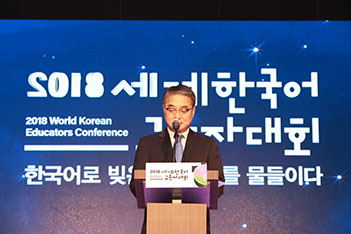
▲ Welcome Speech by Na Jong-min, First Vice-Minister of Culture, Sports and Tourism
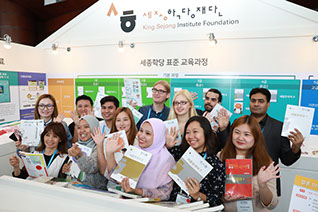
▲ Group photo of participants
Invitation to Heads of Outstanding KSIs,
Appreciation Plaques Ceremony & Korean Cultural Experience
This year, eight chancellors and vice-chancellors of universities were invited for the first time to the World Korean Educators Conference for their outstanding operation of KSIs. At the opening ceremony of the event, National University of Mongolia (Vice President Baldorj Ochirkhuyag) received an award from Minister of Culture, Sports and Tourism and Ankara University, Turkey (Chancellor Erkan Ibis) and six other universities received appreciation plaques from KSIF. After the opening ceremony, they visited various cultural sites such as Changdeokgung Palace and Korea Furniture Museum to experience Korean culture.
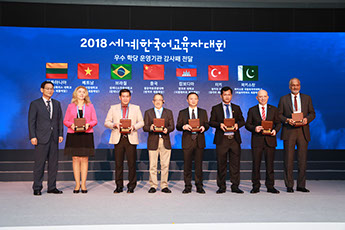
▲ Appreciation plaques for heads of KSIs
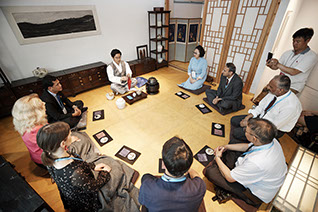
▲ Korean traditional tea ceremony experience (Hagajae Museum)
Training to Strengthen Educators of KSIs
On the second and third day of the conference, diverse Korean language and culture training sessions such as ‘Cultural Education based on Nuri-Sejong Hakdang Contents’ and ‘Case Studies of KSI Cultural Education’ were held for KSIs educators. Especially, Korean traditional culture education method of making traditional bracelets, snare drums and tea confectionery were most popular. “Many educators of KSIs have to conduct classes on Korean culture and I can’t wait to share what I’ve learnt from these training sessions,” said Lee Han-ji from Ho Chi Minh 3 KSI, Vietnam.
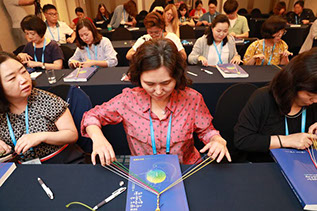
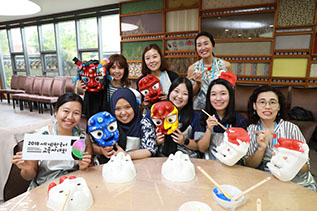
▲ Korean culture class (bracelet-making activity)
▲ Korean cultural experience (mask-making activity)
Administrative Management Training for KSIs Managers
KSIs operations managers underwent training sessions on necessary administrative work such as budget management, curriculum operation and publicity. Not only that, a forum for KSIs managers was held on the third day of the conference. Managers of different KSIs shared their current education status and challenges, and also discussed the ways to collaborate regionally. KSIF plans to review their suggestions from the discussions and implement them in its future operations.
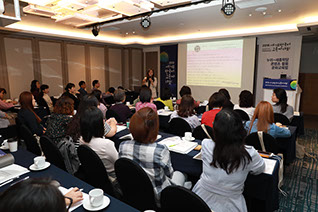
▲ KSI management training
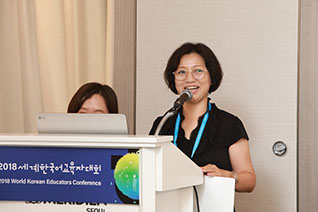
▲ Best practices presentation by Kim Seon-ja, head of Yancheong KSI
Exchange Platform for KSIs Educators and Operation Managers
At the closing ceremony on July 13th, designation certificates were delivered to 16 new KSIs in 13 countries. Also four outstanding participants of each departmental lecture were awarded for their diligent performance.
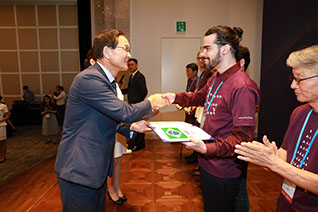
▲ Certificate ceremony for newly designated KSIs
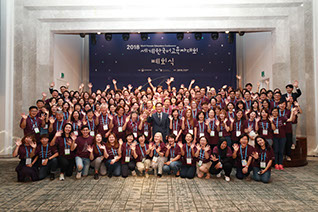
▲ Group photo at closing ceremony
To establish a cooperative network among Korean educators around the globe, KSIF has been hosting the World Korean Educators Conference annually since 2009 and this year is more meaningful as it celebrates its 10th anniversary. Kwon Oh-gil, KSIF Secretary General, said, “The World Korean Educators Conference could not have continued over the last decade without the passion and dedication of our KSI Korean educators and I sincerely hope that they will actively collaborate even further through this conference.”
No.62 | August, 2018
